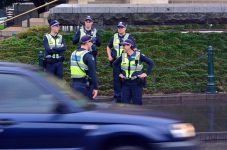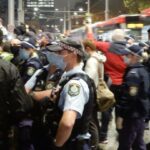Australian Federal Police Allegedly Threaten Union Official’s Family

Members of the Australian Federal Police have been accused of “cowboy activity” in their dealings with a major trade union, according to a recent complaint to the Commonwealth Ombudsman.
The complaint, made on behalf of the Construction, Forestry, Mining and Energy Union, alleges that reprehensible tactics were used by special police taskforces in their investigation of union activities. According to one report, these include a police officer telling Dean Hall, the union’s ACT Branch Secretary, that he knew his children’s names and what time he dropped them off to school.
“Like, I know your kids’ names and their ages and where they go to school and when you drop them off,” the officer is said to have told Hall. “What do you expect? I am profiling you.”
The union’s lawyer, Phillip Pasfield, informed Guardian Australia that such intimidation is a crime and the alleged statements were “unwarranted and designed to threaten Hall”, who was “extremely upset” by the incident.
The union has also raised concerns about repeated attempts by police to question witnesses without their lawyers present and, in one instance, demanding access to the union’s Queensland headquarters without first providing a warrant.
In its submissions to the recent trade union royal commission, the union claims that police told at least two witnesses they did not need to speak to their lawyers, despite their requests to do so. In one case, it is alleged police questioned a witness for 75 minutes without their lawyer present, and without informing her that she was not required to answer their questions.
The letter also says police “intimidated” and “traumatised” a female employee last November, during a raid on its Queensland headquarters, refusing to provide the junior employee with a warrant, before forcing their way into the premises.
“The police officers began shouting at the female employee to get off the phone,” the union said.
Only after the employee “was extremely traumatised and frightened”, did they show her the warrant.
The union has accused the officers involved of bullying their employee, saying it should have been obvious that she was not in a position of authority, and needed to call an official to clarify what she should do.
Mr Pasfield has asked the Ombudsman to investigate the complaint “as soon as practicable, given the ongoing operations of the trade union taskforce”. The AFP and Queensland Police have yet to comment on the matter.
The Politicisation of Police Against Trade Unions
The AFP, Queensland, New South Wales and Victorian Police Forces established special union taskforces in 2014, to support the investigation of the trade union royal commission.
However, unlike like similar taskforces, these have continued to operate, despite the commission concluding in December last year. Unions have expressed concerns that the taskforces have gone beyond their original mandate, and are being used as a political weapon to attack and undermine their activities.
The CFMEU has previously complained that a police sergeant, connected with a raid on their Canberra offices, told a meeting of building industry developers that CFMEU officials were “criminals” and recommended the participants make workplace agreements with the rival Master Builders Association instead.
The CFMEU believes such statements undermine the legitimacy of police as independent umpires: “The CFMEU is extremely concerned that the officer concerned … has engaged in taking sides in industrial matters between employers and the CFMEU.”
The AFP denies the claims, telling the Canberra Times that the purpose of the talk was simply to make “owners aware of their rights and the legislation relevant to their industry.
“This is one of several forums attended by ACT Policing at the request of the MBA, at no time during the presentation did the member advocate on behalf of the MBA or comment for or against CFMEU EBAs.”
The Government’s War Against Trade Unions
The Federal Government has made no secret of its desire to get rid of unions like the CFMEU, recently proposing to resurrect the maligned Australian Building and Construction Commission.
Civil liberties groups have already raised concerns over the proposed Commission, due partly to its ability to exercise ‘coercive power’ over witnesses. Unlike other industry regulators, the Commissioner is given the power to force workers and officials to attend interviews, and remove the right to silence. Failure to comply is punishable by a prison sentence.
Despite the Royal Commission’s 18-month investigation, only one union official has been successfully prosecuted – pleading guilty to ‘blackmail’ earlier this year.
After spending tens of millions of dollars on a Royal Commission which has so far borne little fruit, perhaps it’s time for us to rethink who should be monitored – and it’s probably not a union official’s kids.






